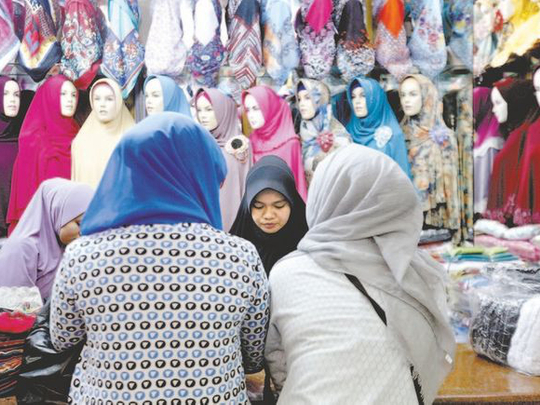
‘Do you speak English?” has got to be the one of the most patronising questions you can be asked. I’m only ever asked that because I wear hijab, as if being a part of western culture and being Muslim are mutually exclusive. Never mind the fact that I was born and raised in London or that I’m going to a Russell Group university to study English — it seems that I will always be stereotyped and judged first by the scarf on my head.
It was also the first question I was asked as I was escorted off an easyJet plane with my sister and brother at 6am last Wednesday morning at Stansted airport. We’d passed security and boarded the flight to Naples, but just as I was about to nod off, we were told there was a seating issue and that all three of us would have to follow the air stewardess, who offered no explanation of where we were going. At the top of the stairs leading down to the tarmac there was a sight I’m not likely to forget in a hurry — a mob of armed police and men in suits waiting for us to meet them. They informed us that a concerned passenger on our flight claimed my sister and I were reading Daesh (the self-proclaimed Islamic State of Iraq and the Levant) material on our phones in Arabic, with the words “Praise be to God” visible. We vehemently denied all claims.
Arabic? There was no Arabic anywhere on our phones. Our family is of Indian origin — none of us even know how to speak Arabic. They then asked why my sister’s passport showed a stamp from Iraq. Ironically, she had gone there to raise money for victims of Daesh!
I showed them the timestamps of my WhatsApp conversations to demonstrate how the only thing I had done on my phone that morning was send a message to my dad about how British Labour Party leader Jeremy Corbyn’s policies compare to other left-wing leaders. Unless being a lefty is a crime these days, I had committed no offence. We had been humiliated, demonised and our holiday delayed for nothing.
As Muslims, we understand that extremism — coupled with a good dose of fear-mongering — has made people wary, so we take extra precautions at airports so as not to prompt any unwarranted suspicion. I’d ordinarily read a prayer for a safe journey but, being aware of how religion has sadly become synonymous with terror in the eyes of many, I refrained from doing so. My sister had wanted to bring Agatha Christie’s Death on the Nile to read on the plane, but I had scoffed imagining the next day’s headline: ‘MUSLIM WOMAN SEEN BRANDISHING MURDER MANUAL’.
No chance, especially after I remembered how a woman was recently detained and her reading material, on art and culture in Syria, was treated like it was a Daesh handbook. But despite all that consideration and care we still ended up as targets. It’s become apparent that Muslims taking extra care to avoid their behaviour being misconstrued will not stop the bigotry that is rife in British society. Making clear that false accusations are a crime is the first step in tackling the issue of ordinary citizens being vilified, with education to combat ignorance being a close second. If this had happened in any other context, the couple who made the baseless claim against us would be charged with an offence for wasting police time.
So why is this prejudice suddenly OK when it’s Muslims who are the targets? Is the next step going to be that we’re treated as second-class citizens, with the scarf on my head giving people licence to tarnish my name with impunity? Islamophobia has now become racialised. It was my sister and I who were labelled as Daesh supporters, with my green-eyed brother, who could pass as white, only being questioned by association.
There are Sikh men who have been targeted by Islamophobic bigots in the same way Muslims are, simply for covering their heads. The common thread tying the tales of intolerance together seems to be that anyone who doesn’t conform to a standardised appearance is made to feel like a criminal. What happened to us and many others is not a mere misunderstanding or mistake, it’s racism based on profiling.
Nobody is denying that extremism is a global issue that needs to be tackled, but pointing an accusing finger at any woman in a headscarf is a no way of going about it. The only way for society to progress is for the public to be aware that Muslims are exactly the same as everyone else and that discrimination and suppressing someone’s right to practice their religion without fear of persecution goes against the core democratic values of Britain.
— Guardian News & Media Ltd
Maryam Dharas is an English Literature student and writer from London.











